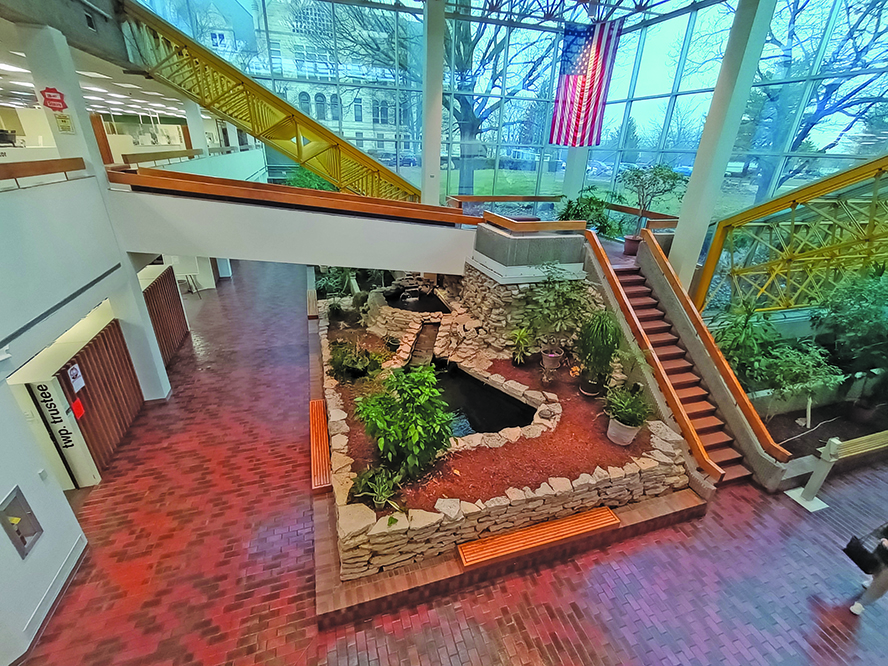Commissioners support programs that will provide transitional housing
Wayne County lacks transitional housing for those recovering from addiction.
The county’s $411,000 initial share of a national opioid settlement presented an opportunity to help fill that void. It’s an opportunity the county commissioners took.
“The seven organizations that were awarded opioid settlement money are addressing an urgent need in Wayne County,” said Commissioner Mary Anne Butters after commissioners finalized their settlement funding commitments during the Feb. 22 meeting. “Six of them will provide greatly needed housing and to some extent treatment for those who are recovering from opioid use disorder and will continue and expand their valuable service in the saving of lives.”
Commissioners had agreed on a preliminary distribution plan the previous week; however, they requested tax returns and project budgets from the seven selected programs. With those received, the three commissioners on Feb. 22 unanimously approved issuing commitment letters to the seven programs.
There was urgency to commit the funds because some programs might apply for additional state funding, and the committed county money qualifies as local matching funds. The state made $25 million available for the additional grants with a Feb. 28 deadline.
The county received Dec. 9 its 2022 share of the national settlement with opioid manufacturer Johnson & Johnson and distributors Cardinal Health, McKesson and Amerisource Berger. The county is due $74,688.59 as this year’s installment from that settlement, which for the county totals about $1.95 million through 2038.
Butters also expects the county to receive about $300,000 this year from a settlement reached with retailers CVS, Walgreens and Walmart.
Providing transitional housing continues progress that began in Wayne County with establishment of residential treatment facilities. Butters said the next step is long-term supportive housing that incorporates medical treatment with the housing, and a state agency might provide a grant to provide such a service.
“Residential treatment is very much mental health and medical, but residential treatment is too short term,” she said. “You need the long-term supportive housing, and that’s what Wayne County is missing. Supportive housing is essential for long-term recovery.”
Commissioners did fund one program that Butters said includes medical treatment. Meridian Health Services received a $50,000 commitment to provide housing for recovering mothers with babies.
Other programs funded are:
- Cross Road Recovery Center, up to $160,000 after receiving bids for a new septic system at its residential recovery program and transitional living program for women;
- Centerstone, $104,000 to begin a transitional residence for men;
- Bridges for Life, $35,000 to pay expenses while removing individuals’ barriers to treatment and connecting them with treatment facilities;
- Refuge of Hope, $35,000 for renovations to its building that houses a temporary shelter for women and a Next Step recovery program;
- Salt of the Earth, $15,000 to develop a sobriety house for men; and
- Hope House, $12,000 to pay utility bills for its residential treatment program for men.
The seven programs were selected from 23 applicants following a grading scale that prioritized saving lives.
“It was my hope that more than the seven of the 23 applicants would receive awards, because each applicant had merit in the services they would provide,” Butters said.
Commissioners graded and ranked the applicants and opted to fully fund or significantly fund the top-ranked programs.
Annex improvements
Commissioners continue to consider projects that adhere to the sheriff’s department safety recommendations and Americans with Disabilities Act compliance for the Wayne County Administration Building.
Numbering has been placed on the building’s doors to assist with locations in case of an emergency. Film that prevents the doors’ glass from shattering and film that prevents those outside from seeing in have already been applied to the doors.
Commissioner Jeff Plasterer said he’s requested estimates for a wall on the main floor’s west wing where the auditor’s and treasurer’s offices are located. A wall with electronically controlled doors and windows to assist customers is also part of the security proposal.
The west wing would be the first area to receive a wall because that corridor’s offices conduct the most cash transactions. Other wings could follow with improved security.
Another $10,000 in projects involve putting epoxy finishing on the ramp floor leading to the Emergency Management Agency office and installing ADA compliant railings on the bridge and staircase between the main and lower levels.
The epoxy is estimated to cost $4,300. It would be similar to the coating applied to the coroner’s office floors. The necessary railings are estimated to cost $5,700. The $10,000 would come from the buildings and grounds budget.
Wellness program
Commissioners unanimously approved a contract with Reid Health to supply eligible county employees with a wellness program.
The $5-per-month program would be for employees and spouses covered by the county insurance plan. It includes a variety of options, including some that would be at the participants’ cost, and will enable participant feedback to a wellness council.
The one-year contract includes a minimum $500 monthly payment, the equivalent of 100 participants. The payment would rise $5 for each additional participant. Commissioners expressed hope there would be additional participants.
A version of this article appeared in the March 1 2023 print edition of the Western Wayne News.

